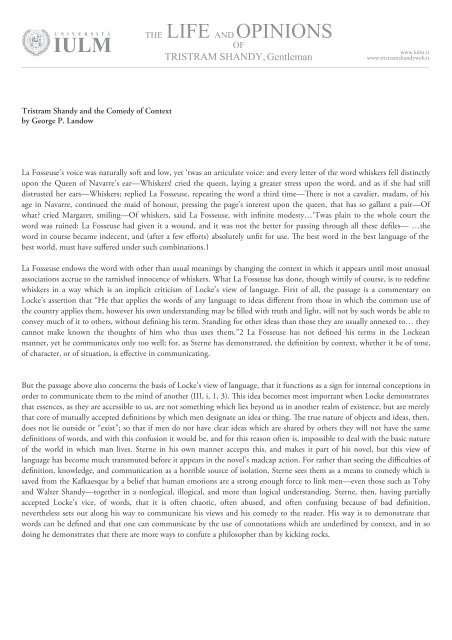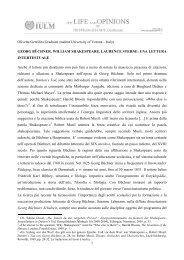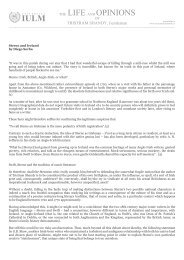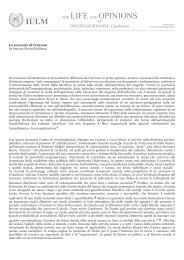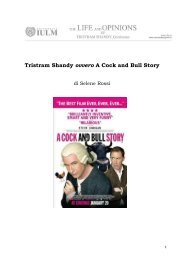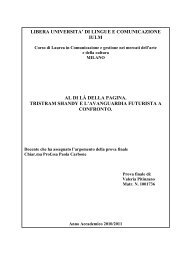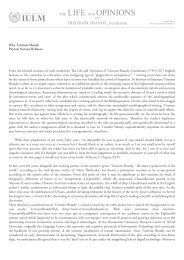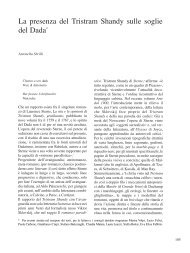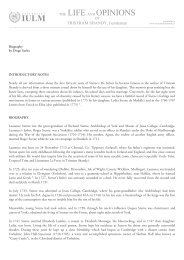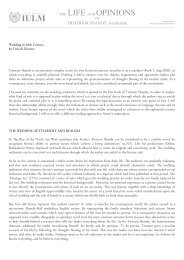Comedy_of_Context_by_ Landow - The Tristram Shandy Web | IULM
Comedy_of_Context_by_ Landow - The Tristram Shandy Web | IULM
Comedy_of_Context_by_ Landow - The Tristram Shandy Web | IULM
- No tags were found...
You also want an ePaper? Increase the reach of your titles
YUMPU automatically turns print PDFs into web optimized ePapers that Google loves.
www.iulm.itwww.tristramshandyweb.it<strong>Tristram</strong> <strong>Shandy</strong> and the <strong>Comedy</strong> <strong>of</strong> <strong>Context</strong><strong>by</strong> George P. <strong>Landow</strong>La Fosseuse’s voice was naturally s<strong>of</strong>t and low, yet ‘twas an articulate voice: and every letter <strong>of</strong> the word whiskers fell distinctlyupon the Queen <strong>of</strong> Navarre’s ear—Whiskers! cried the queen, laying a greater stress upon the word, and as if she had stilldistrusted her ears—Whiskers; replied La Fosseuse, repeating the word a third time—<strong>The</strong>re is not a cavalier, madam, <strong>of</strong> hisage in Navarre, continued the maid <strong>of</strong> honour, pressing the page’s interest upon the queen, that has so gallant a pair—Ofwhat? cried Margaret, smiling—Of whiskers, said La Fosseuse, with infinite modesty…‘Twas plain to the whole court theword was ruined: La Fosseuse had given it a wound, and it was not the better for passing through all these defiles— …theword in course became indecent, and (after a few efforts) absolutely unfit for use. <strong>The</strong> best word in the best language <strong>of</strong> thebest world, must have suffered under such combinations.1La Fosseuse endows the word with other than usual meanings <strong>by</strong> changing the context in which it appears until most unusualassociations accrue to the tarnished innocence <strong>of</strong> whiskers. What La Fosseuse has done, though wittily <strong>of</strong> course, is to redefinewhiskers in a way which is an implicit criticism <strong>of</strong> Locke’s view <strong>of</strong> language. First <strong>of</strong> all, the passage is a commentary onLocke’s assertion that “He that applies the words <strong>of</strong> any language to ideas different from those in which the common use <strong>of</strong>the country applies them, however his own understanding may be filled with truth and light, will not <strong>by</strong> such words be able toconvey much <strong>of</strong> it to others, without defining his term. Standing for other ideas than those they are usually annexed to… theycannot make known the thoughts <strong>of</strong> him who thus uses them.”2 La Fosseuse has not defined his terms in the Lockeanmanner, yet he communicates only too well; for, as Sterne has demonstrated, the definition <strong>by</strong> context, whether it be <strong>of</strong> tone,<strong>of</strong> character, or <strong>of</strong> situation, is effective in communicating.But the passage above also concerns the basis <strong>of</strong> Locke’s view <strong>of</strong> language, that it functions as a sign for internal conceptions inorder to communicate them to the mind <strong>of</strong> another (III, i, 1, 3). This idea becomes most important when Locke demonstratesthat essences, as they are accessible to us, are not something which lies beyond us in another realm <strong>of</strong> existence, but are merelythat core <strong>of</strong> mutually accepted definitions <strong>by</strong> which men designate an idea or thing. <strong>The</strong> true nature <strong>of</strong> objects and ideas, then,does not lie outside or “exist”; so that if men do not have clear ideas which are shared <strong>by</strong> others they will not have the samedefinitions <strong>of</strong> words, and with this confusion it would be, and for this reason <strong>of</strong>ten is, impossible to deal with the basic nature<strong>of</strong> the world in which man lives. Sterne in his own manner accepts this, and makes it part <strong>of</strong> his novel, but this view <strong>of</strong>language has become much transmuted before it appears in the novel’s madcap action. For rather than seeing the difficulties <strong>of</strong>definition, knowledge, and communication as a horrible source <strong>of</strong> isolation, Sterne sees them as a means to comedy which issaved from the Kafkaesque <strong>by</strong> a belief that human emotions are a strong enough force to link men—even those such as To<strong>by</strong>and Walter <strong>Shandy</strong>—together in a nonlogical, illogical, and more than logical understanding. Sterne, then, having partiallyaccepted Locke’s vice, <strong>of</strong> words, that it is <strong>of</strong>ten chaotic, <strong>of</strong>ten abused, and <strong>of</strong>ten confusing because <strong>of</strong> bad definition,nevertheless sets out along his way to communicate his views and his comedy to the reader. His way is to demonstrate thatwords can be defined and that one can communicate <strong>by</strong> the use <strong>of</strong> connotations which are underlined <strong>by</strong> context, and in sodoing he demonstrates that there are more ways to confute a philosopher than <strong>by</strong> kicking rocks.
Locke had written that “all the artificial and figurative applications <strong>of</strong> words that eloquence hath invented, are for nothing elsebut to insinuate wrong ideas, move the passions, and there<strong>by</strong> mislead the judgment; and so indeed are perfect cheats… <strong>The</strong>yare certainly, in all discourses that pretend to inform or instruct, wholly to be avoided; and where truth and knowledge areconcerned cannot but be thought a great fault” (III, X, 34, 146). Locke believes that words can only function effectively whendenotations, the definitions formulated within a purely intellectual context, carry the burden <strong>of</strong> meaning. This denies thevalue <strong>of</strong> literature, which largely communicates not <strong>by</strong> denotation but <strong>by</strong> the indirect definition the context <strong>of</strong> a dramaticsituation provides. La Fosseuse demonstrates the possibility <strong>of</strong> such definition <strong>by</strong> context, and such definition is actuallyimplicit in Locke’s view <strong>of</strong> language: Locke’s view is that because nature is only organized and hence only accessible in wordswhich are, in turn, signs <strong>of</strong> ideas in the mind, one must go to the mind to understand what is meant when a person speaks <strong>of</strong>external reality. <strong>The</strong> minds <strong>of</strong> the speaker and the listener, then, are the contexts to which the word is related and <strong>by</strong> which itis defined (III, ix, 4, 105). Locke’s attempt to define the bounds <strong>of</strong> human understanding leads to a consideration <strong>of</strong> themanner in which the mind works (Introduction, 2-4, 26-8), and, similarly, his concern with language leads to a need forknowledge <strong>of</strong> what the speaker means <strong>by</strong> a word; for each person has his own definition that is slightly different than anyoneelse’s, and to communicate one must have some knowledge <strong>of</strong> what a word means in the context <strong>of</strong> the other person’s mind.After asking Uncle To<strong>by</strong> where he received his wound, the Widow Wadman would certainly agree:My uncle To<strong>by</strong> returned into the parlour, and sat himself down again upon the sopha.You shall lay your finger upon the place—said my uncle To<strong>by</strong>.—I will not touch it, however, quoth Mrs. Wadman to herself.This requires a second translation—it shews what little knowledge is gotten <strong>by</strong> mere words—we must go to the first springs.(IX, xx, 624)This second translation requires the gloss <strong>of</strong> each character’s mind, for it is in this context, in this little world, that one mustdiscover meanings for words. Sterne has produced comedy <strong>by</strong> making these contexts far more individual, far more private, farmore hob<strong>by</strong>-horsical than Locke intended, and what he has done is to concertize an abstract idea, that is, to illustrate it and toqualify it, <strong>by</strong> bringing it from the category <strong>of</strong> words to the category <strong>of</strong> things. This placement <strong>of</strong> something from the world <strong>of</strong>abstract language in the world which represents everyday life produces an incongruity which is comic and may be, whenrecognizably derived from a particular source, satirical as well. A good example <strong>of</strong> Sterne’s general method occurs when Trimenters the learned discussion about radical dryness and moisture:And what conclusion dost thou draw, Corporal Trim, cried my father, from all these premises?I infer, an’ please your worship, replied Trim, that the radical moisture is nothing in the world but ditch-water—and that theradical heat, <strong>of</strong> those who can go to the expense <strong>of</strong> it, is burnt brandy—the radical heat and moisture <strong>of</strong> a private man, an’please your honours, is nothing but ditch-water—and a dram <strong>of</strong> geneva—and give us but enough <strong>of</strong> it, with a pipe <strong>of</strong> tobacco,to give us the spirits, and drive away the vapours—we know not what it is to fear death. (V, xl, 401-2)That Trim should enter the discussion at all, or that he should use the scholastic term <strong>of</strong> inference, is one aspect <strong>of</strong> Trim’sworld encountering Walter’s, but the final encounter is the ossification <strong>of</strong> Walter’s abstract idea <strong>by</strong> something from the world<strong>of</strong> existence. This reductio ad absurdum which causes or which results from the clashing <strong>of</strong> two worlds, two contexts, or twocategories, is Sterne’s primary comic technique, and it is, in essence, a comic extension <strong>of</strong> Locke which takes the philosopherfrom the world <strong>of</strong> his study into the world <strong>of</strong> action and conversation. In relation to the characters, the contexts may be those<strong>of</strong> the everyday world, those <strong>of</strong> the everyday world and a private one, or those <strong>of</strong> two private, isolated worlds, such as those inwhich To<strong>by</strong> and Walter live.
Some <strong>of</strong> the finest comic scenes arise from the collision <strong>of</strong> the world <strong>of</strong> To<strong>by</strong> and the world <strong>of</strong> Walter, but before Sterne cancapitalize upon these collisions he must first establish the worlds <strong>of</strong> his characters, and he begins this early in <strong>Tristram</strong> <strong>Shandy</strong>.Hearing the noise <strong>of</strong> running feet over their heads while they are waiting for the birth <strong>of</strong> <strong>Tristram</strong>, Walter turns to To<strong>by</strong> andasks him,—I wonder what’s all that noise, and running backwards and forwards for, above stairs. What can they be doing, brother?. .I think, replied my uncle To<strong>by</strong>, taking his pipe from his mouth, and striking the head <strong>of</strong> it two or three times upon the nail<strong>of</strong> his left thumb, as he began his sentence, —I think, says he:—But to enter rightly into my uncle To<strong>by</strong>’s sentiments uponthis matter, you must be made to enter first a little into his character, the outlines <strong>of</strong> which I shall just give you, and then thedialogue between him and my father will go on as well again. (I, xxi, 63)This explanatory digression takes thirty-six pages in the Work text before we are returned to the next part <strong>of</strong> that sentence, butin that period Sterne has been able to establish To<strong>by</strong>’s hob<strong>by</strong>-horse, his modesty, and his history. Sterne sets the words <strong>of</strong> hischaracters firmly within the context <strong>of</strong> their personalities. In the case <strong>of</strong> Walter and To<strong>by</strong> these personalities are isolatingfactors causing them to see everything in terms <strong>of</strong> their particular hob<strong>by</strong>-horse. In any conversation between these two humorcharacters there is almost certain to be a lapse in communication as soon as an area <strong>of</strong> mutual hob<strong>by</strong>-horsicality isencountered.At the one point when Walter seems to understand To<strong>by</strong>’s way <strong>of</strong> seeing things and hence appears to be communicating, itturns out, instead, that the subject <strong>of</strong> concern is not a bridge for To<strong>by</strong>’s fortifications but for his son’s nose, which, along withWalter’s own hob<strong>by</strong>-horse, has just been crushed <strong>by</strong> Slop’s forceps— "Lead me, brother To<strong>by</strong>, cried my father, to my roomthis instant” (III, xxvii, 215). And this, <strong>of</strong> course, requires the digression <strong>of</strong> fifty-eight pages which presents the world <strong>of</strong>Walter’s mind and its belief in the importance <strong>of</strong> names, noses, birth, and education—all in some sense a comic commentaryon both Walter and on Locke. My father “was serious;—he was all uniformity;—he was systematical, and, like all systematickreasoners, he would move both heaven and earth, and twist and torture every thing in nature to support his hypothesis. In aword, I repeat it over again;—he was serious” (I, xix, 53). Though he is well-meaning, this serious man’s attempts to mold theworld into system and pattern appear as the greatest absurdities, and, as his ossified vision continually peeps out upon the fluxabout him, he becomes both the target <strong>of</strong> gentle satire and the cause <strong>of</strong> comedy. Walter assures Yorick with the solemnity <strong>of</strong>science “that there is a North-West passage to the intellectual world—<strong>The</strong> whole depends, added my father, in a low voice,upon the auxiliary verbs, Mr. Yorick, Had Yorick tread upon Virgil’s snamek, he could not have been more surprised” (V, xlii,404). Once again Walter’s hob<strong>by</strong> horse has thrust something <strong>of</strong> apparently minor importance into contact with something <strong>of</strong>a very different scale; and the difference in scale causes the surprise <strong>of</strong> an expectation which has been denied. <strong>The</strong>confrontation <strong>of</strong> two scales <strong>of</strong> value, <strong>of</strong> two contexts, reduces Walter’s concern with auxiliary verbs to the level <strong>of</strong> absurdity.This typical reduction <strong>of</strong> an idea to absurdity <strong>by</strong> carrying it beyond its usual context derives additional force because Locke, inhis chapter “Of Particles,” makes much <strong>of</strong> a similar matter.3It is true that Locke was working with abstract ideas in his study and that to remove them from this context will naturallymake them absurd; and to mock them is perhaps too unfair to Locke. But one point for which Locke cannot be excused, saysSterne, is his unbalanced and unbalancing elevation <strong>of</strong> understanding above wit and emotion, when the fact <strong>of</strong> the matter isthat all must always be in balance. To one who sees the world as comedy the denial <strong>of</strong> importance to wit is the more alarming,because it “has been made the Magna Carta <strong>of</strong> stupidity” (III, xx, 202), enabling those without wit and humor to claimsolemn wisdom as their realm, while Sterne, one feels, would hold that wisdom is never solemn. Sterne says he does not writehis book for such serious ones, but he does write it with them, with Mr. John Locke and Mr. Walter <strong>Shandy</strong>. “My father,whose way was to force every event in nature into an hypothesis, <strong>by</strong> which means never man crucified TRUTH at the rate hedid” (IX, xxxii, 644), tries continually to impose system on all around him, while brother To<strong>by</strong>, who sees everything inrelation to his military hob<strong>by</strong>-horse, bumblingly exposes his obsession <strong>by</strong> taking everything as though it had immediaterelevance to his own world: these two men are incarnations <strong>of</strong> Locke’s statements in Chapter X, “<strong>The</strong> Abuse <strong>of</strong> Words,” and assuch they fulfill our expectations, for their contexts are so personal that they cannot communicate <strong>by</strong> words. After To<strong>by</strong> has
led Walter to his room, and after Sterne has carefully provided the setting with an elaborate description <strong>of</strong> Walter’s posture <strong>of</strong>grief, he has Walter break the silence as follows—Did ever man, brother To<strong>by</strong>, cried my father, rising himself up upon his elbow, and turning himself round to the oppositeside <strong>of</strong>f the bed where my uncle To<strong>by</strong> was sitting in his old fringed chair, with his chin resting upon his crutch—did ever apoor unfortunate man, brother To<strong>by</strong>, cried my father, receive so many lashes? <strong>The</strong> most I ever saw given, quoth my uncleTo<strong>by</strong>, (ringing the bell at the bed’s head for Trim) was to a grenadier, I think in Makay’s regiment.—Had my uncle To<strong>by</strong>shot a bullet through my father’s heart, he could not have fallen down with his nose upon the quilt more suddenly.Bless me! said my uncle To<strong>by</strong>. (IV, iii, 274)Although they are aware <strong>of</strong> each other’s hob<strong>by</strong>-horse, they are nevertheless so concerned with their own that they cannotcommunicate with words, and their Marx brothers’ dialogue continually impinges the world, the humor, the context <strong>of</strong> theone upon the other with the resultant double-meanings and plays on word and idea. But this does not leave Walter and To<strong>by</strong>and us in isolated boxes, ghostly Robinson Crusoes (to quote Ryle) living within the mechanical islands <strong>of</strong> our bodies; forgranted that, because no one has the same context, denotational, philosophical language will, for all its occasional efficiency, bemost <strong>of</strong>ten subject to misunderstanding. Nonetheless, human beings have two means <strong>of</strong> communication: there is humanfeeling, which is the language <strong>of</strong> benevolence, and connotational meanings, which are the language <strong>of</strong> art. <strong>The</strong>se cut across,even if they do not explain, the “riddles and mysteries” (IV, xvii, 293) among which we live. For all that To<strong>by</strong> and Walter canrarely explain their ideas to each other, their good natures bind them together in a firm understanding. For example, afterTrim has cut up Walter’s boots for siege mortars to be used in To<strong>by</strong>’s scale-model war, a peculiarly chaotic conversationoccurs, but, at last, “My father could not help smiling for his soul;—his anger at the worst was never more than a spark,—andthe zeal and simplicity <strong>of</strong> Trim,—and the generous (tho’ hob<strong>by</strong>-horsi-cal) gallantry <strong>of</strong> my uncle To<strong>by</strong>, brought him intoperfect good humour with them again” (Ill, xxii, 206). <strong>The</strong> communication that takes place is not <strong>by</strong> the denotation <strong>of</strong> thewords, but through the conclusions indirectly drawn <strong>by</strong> Walter—that Trim is zealous and simple and good in To<strong>by</strong>’s behalf,and that To<strong>by</strong> is generously gallant for the sake <strong>of</strong> his country, both <strong>of</strong> which are perceived from a long-established context.Sterne has shown that Locke’s views <strong>of</strong> language are, in one aspect, quite correct, and he has used the problem <strong>of</strong> definition forhis comedy. On the other hand, he has shown, first, that such problems <strong>of</strong> definition and communication are not <strong>of</strong> ultimateimportance in relation to his characters; and second, that art, which defines in a non-Lockean manner, is a proper means <strong>of</strong>communication. Sterne has accepted definition <strong>by</strong> context, carried it beyond what Locke intended, and shown that, contraryto Locke’s assertions, such definition <strong>by</strong> artistic context works better than attempts at denotational communication.Walter’s method <strong>of</strong> understanding once again points up Sterne’s emphasis upon the indirect aspects <strong>of</strong> communication. <strong>The</strong>context <strong>of</strong> To<strong>by</strong>’s goodness evokes the best <strong>of</strong> Walter’s feelings, and this reliance upon the benevolence <strong>of</strong> feeling is dependentupon and derived from two major influences upon Sterne, the church and Locke. <strong>The</strong> favorable attitude toward feeling is inlarge part the result <strong>of</strong> the Latitudinarian movement in the church4 and it is further supported <strong>by</strong> Locke’s empiricism, whichimplies that, since all knowledge must be derived from experience, [therefore] all experience, all sensation must be good5Sterne not only believes wit and judgment cannot be separated, but that “REASON is half <strong>of</strong> it SENSE; and the measure <strong>of</strong>heaven itself is but the measure <strong>of</strong> our present appetites and concoctions” (VII, xiii, 494). While this has many meanings andmany contexts, among them that reason is empirically derived, it also means that “A man’s body and his mind, with theutmost reverence to them both I speak it, are exactly like a jerkin, and a jerkin’s lining;—rumple the one—you rumple theother” (III, iv, 160). Sterne’s need to set things in context, in their complete and proper setting, causes him to see mind andbody, head and heart, sex and love, and sense and nonsense in a series <strong>of</strong> continuums, a vision which prevents hardening <strong>of</strong>both the heart and categories. This rooting <strong>of</strong> things deeply within their context, which is one aspect <strong>of</strong> the wide perspective <strong>of</strong>a comic vision, makes the logic chopping <strong>of</strong> Walter and <strong>of</strong> Locke the more ridiculous. But while there is some mocking <strong>of</strong>Locke, and while there is some sharp satire, especially that <strong>of</strong> learned hokum, Sterne is primarily a writer not <strong>of</strong> satire, but <strong>of</strong>comedy: Walter and To<strong>by</strong> are <strong>by</strong> and large not targets <strong>of</strong> satire but the subjects <strong>of</strong> comedy. <strong>The</strong> multiple perspective created<strong>by</strong> the different contexts provides an irony which leads to understanding, not censure. <strong>The</strong> importance <strong>of</strong> these personal
contexts requires Sterne to define his characters and provides one mechanical reason for the digressive structure <strong>of</strong> <strong>Tristram</strong><strong>Shandy</strong>.Thus far I have been discussing context or setting as it emanates from the minds <strong>of</strong> the various characters, and have beenconcentrating upon To<strong>by</strong> and Walter <strong>Shandy</strong>, because they exemplify the individual mind as particular world at its mostcomically obvious. Sterne not only deals with the worlds <strong>of</strong> the mind, but with the adjacent worlds <strong>of</strong> art and life, and much<strong>of</strong> the novel is concerned with the encounter <strong>of</strong> the two. Sterne creates a fictive reader, the Sir or Madam to whom so manycomments are addressed and who sits at Sterne’s elbow watching the events and occasionally interrupting their presentation.While this reader provides an excuse for Sterne to address his audience through the voice <strong>of</strong> <strong>Tristram</strong>, his narrator, thisconvention is so used that this audience becomes a character in the novel like those repouss‚ figures in baroque painting whoturn half toward the audience and half toward the scene being presented. Sir and Madam have their own context whichfurnishes something for the novel to be fitted into, or better, something to which the novel’s “inner” action can be contrasted.While, <strong>of</strong> course, this reader is part <strong>of</strong> the novel and this is not real life, he or she represents the world <strong>of</strong> conventional novelsand insensitive readers. This aspect <strong>of</strong> <strong>Tristram</strong> <strong>Shandy</strong> points up the problems <strong>of</strong> art as a means <strong>of</strong> communication. <strong>The</strong>critical history <strong>of</strong> the novel would suggest that many actual readers are in the same relation to the novel as is To<strong>by</strong> to Walter:sympathy but not understanding. When <strong>Tristram</strong> assigns penance to his lady reader for not reading his novel closely enough,thus playing a joke both upon himself and upon the conventional skimmer <strong>of</strong> pages, he would seem to be emphasizing thataspect <strong>of</strong> his work which is likely to be neglected. “I wrote a careless kind <strong>of</strong> civil, nonsensical, good-humored Shandean book,which will do all your hearts good—And all your heads too,—provided you understand it” (VI, xvii, 436), he adds later in thenovel, expecting that it will cure the spleen before it strikes the mind.<strong>Tristram</strong> and his reader occasionally carry on a dialogue which is much like that <strong>of</strong> Walter and To<strong>by</strong>, but this comedy is due asmuch to the reader’s ignorance <strong>of</strong> events, his lack <strong>of</strong> proper context, as to his lack <strong>of</strong> perception. In the first chapter this fictivereader creates a comic misunderstanding <strong>by</strong> the infliction <strong>of</strong> a usual context and its associations upon the particular andpeculiar situation <strong>of</strong> Walter <strong>Shandy</strong>’s one night a month. After Walter <strong>Shandy</strong> has burst out, “Did ever woman, since thecreation <strong>of</strong> the world, interrupt a man with such a silly question?” our reader inquires, “Pray, what was your father saying?—”“Nothing,” replies <strong>Tristram</strong> (I, i, 5). <strong>The</strong> creation <strong>of</strong> this reader provides a means <strong>of</strong> varying comic distance and perspective,and, because such a device must interrupt the primary action, it also gives Sterne another way <strong>of</strong> controlling the pace <strong>of</strong> thenovel. This fictional reader is about as close as one can get to bringing the audience into the story, and the creation <strong>of</strong> thisouter circle adds a new context which not only provides additional possibilities for comedy but which also produces animplicit commentary on the relation <strong>of</strong> the novel to the world outside it.Critics have remarked on Sterne’s devices as a means <strong>of</strong> criticizing the conventional novel <strong>of</strong> his time6 ; but more importantthan these criticisms, some <strong>of</strong> which are tongue in cheek, is the novelist’s concern with the relation <strong>of</strong> convention to the realityit is supposed to represent. We see Sterne’s attitudes toward the capability <strong>of</strong> literature from another vantage point when hebrings objects from the external world into the novel, when he inflicts not representations <strong>of</strong> reality but real things upon thecontext <strong>of</strong> his fiction. Such expressionistic devices as the black page which follows the announcement <strong>of</strong> Yorick’s death and themarble page which is to be an emblem <strong>of</strong> the novel are all attempts to gain a new notation that is more effective than words.Once an object is introduced into the context <strong>of</strong> a work <strong>of</strong> art, it no longer is an object for it has become language. <strong>The</strong> mostobvious example, perhaps, is the introduction <strong>of</strong> the musical notation for “Lilliburlero,” which is used to describe To<strong>by</strong>’scharacter. Similarly, in the last book Trim gives an eloquent speech without words. As uncle To<strong>by</strong> and Trim advance to afrontal attack on the willing Mrs. Wadman, Trim says the final word for the bachelor’s life: “Whilst a man is free—cried theCorporal, giving a flourish with Ms stick thus—[and then Sterne gives the path <strong>of</strong> the stick’s movement]. A thousand <strong>of</strong> myfather’s most subtle syllogisms could not have said more for celibacy. My uncle To<strong>by</strong> look’d earnestly towards his cottage andhis bowling green” (IX, iv, 604). But, <strong>of</strong> course, these strangely introduced elements are not a marble page, a sheet <strong>of</strong> music, ora pattern <strong>of</strong> movement any longer; for once they have been introduced into the context <strong>of</strong> the novel, however uncomfortablyor humorously they may remain there, they have become redefined <strong>by</strong> their present company. Once more Sterne has shownthat nondenotative language can communicate when it has the proper context. Sterne here reverses a frequent tactic, movingsomething from the category <strong>of</strong> object into the category <strong>of</strong> word and idea. <strong>The</strong>se contrasts between different orders <strong>of</strong> realitycomment upon the nature <strong>of</strong> art, and, <strong>by</strong> pointing out its limits, help keep it—or at least the reader—as flexible as the realitythe novel is trying to present.
Just as Sterne tries to keep his language from solidifying, so, too, he attempts to keep his novel and his reader limber,implicitly warning us that conventions are only conventions “and not to be taken as reality. But it is the nature and purpose <strong>of</strong>all system, whether it be <strong>of</strong> convention or <strong>of</strong> philosophy, to limit human experience <strong>by</strong> the imposition <strong>of</strong> pattern, and hence toprovide an order <strong>by</strong> which we can live. Systematizing is <strong>by</strong> nature solemn; it is also intrinsically false, both in that the systemmust in some areas be an inadequate description <strong>of</strong> reality, and in that it is too serious about its pretensions <strong>of</strong> adequacy.Sterne’s comedy continually sets the various systems <strong>of</strong> John Locke, Walter <strong>Shandy</strong>, and the artist within a wider context,which is fatal to the solemnity <strong>of</strong> any systems that have pretensions <strong>of</strong> completeness. By its very nature and reason forexistence, a system attempts to provide a complete context in its particular area, giving all the answers and expanding into allthe empty spaces; but the eye <strong>of</strong> comedy is always matching context and system, which, inevitably, is a process <strong>of</strong> reduction foranything which is supposedly complete. <strong>Tristram</strong> <strong>Shandy</strong> uses, starters, and comments upon Locke’s view <strong>of</strong> language. Lockeis suggestive and perceptive, but not complete enough, and, like Walter <strong>Shandy</strong>, he is too rigid and systematical. In Walter wesee all the foibles <strong>of</strong> the system maker carried to greatest extremes. His encounters with life produce the most powerful, mostcomical commentary on systems <strong>of</strong> all kinds. At the opening <strong>of</strong> the novel and in the first long digression about him, the readerlearns <strong>of</strong> Walter’s systematizing hob<strong>by</strong>-horsical-ity and <strong>of</strong> its expression in elaborate theories <strong>of</strong> childbirth and childbearing.But from the beginning, the very beginning, <strong>of</strong> <strong>Tristram</strong>’s existence the systems topple <strong>of</strong> their own weight; for, after all, it isWalter’s systematic winding <strong>of</strong> the clock which causes all the trouble. He was a very exact man, andAs a small specimen <strong>of</strong> this extreme exactness <strong>of</strong> his, to which he was in truth a slave,—he had made it a rule for many years <strong>of</strong>his life,—on the first Sunday night <strong>of</strong> every month throughout the whole year,—as certain as ever the Sunday night came,—towind up a large house-clock which we had standing upon the back-stairs head, with his own hands:—… he had likewisegradually brought some other little family concernments to the same period, in order, as he would <strong>of</strong>ten say to my uncle To<strong>by</strong>,to get them all out <strong>of</strong> the way at one time… from an unhappy association <strong>of</strong> ideas which have no connection in nature, it s<strong>of</strong>ell out at length, that my poor mother could never hear the said clock wound up,—but the thoughts <strong>of</strong> some other thingsunavoidably popp’d into her head,—& vice versa. (I, iv, 8-9)<strong>The</strong> problem with the system is that it does not take into account the nature <strong>of</strong> the human mind, which includes thisassociation <strong>by</strong> habit as well as denotative faculties, and this, <strong>of</strong> course, is what is wrong with Locke. Having realized that his<strong>of</strong>fspring’s troubles had begun nine months before birth and had been increased <strong>by</strong> Slop’s forceps, Walter next tries tocounteract this with his opinion, “That there was a strange kind <strong>of</strong> magick bias, which good or bad names, as he called them,irresistibly impress’d upon our characters and conduct” (I, xviii, 50). This is an extreme example, perhaps, <strong>of</strong> Locke’s pointthat taking words for things causes great difficulty in thought, but it is also an example <strong>of</strong> taking words too seriously and <strong>of</strong>trying to impose them on another order <strong>of</strong> reality. Once again, Walter’s system helps destroy itself, for <strong>by</strong> choosingTrismegistus, a name <strong>of</strong> which no one has heard, and which resembles <strong>Tristram</strong>, the name he most dislikes, Walter providesthe possibility for the inevitable Shandean confusion. Finally, when it is obvious that everything has gone wrong for <strong>Tristram</strong>,Walter begins to apply his system to the education <strong>of</strong> his son. He begins to write the massive Tristra-poedia, but <strong>by</strong> the timehe has set his thoughts in order and culled the answers from the scholastic masters, three years have elapsed, and during thewhole period, <strong>Tristram</strong> remarks, “I was all that time totally neglected and abandoned to my mother” (V, xvi, 375). <strong>The</strong>sesystems are not only removed from life but also prevent Walter from living and acting.Better than all these systems <strong>of</strong> education are the disordered associations <strong>of</strong> good examples. To<strong>by</strong>’s benevolence towards thefly, which occurs when <strong>Tristram</strong> is ten years old, finds a way to the boy’s heart—I know, that the lesson <strong>of</strong> universal good-will then taught and imprinted <strong>by</strong> my uncle To<strong>by</strong>, has never since been worn out <strong>of</strong>my mind: And tho’ I would not depreciate what the study <strong>of</strong> the Literae humanlores, at the university, have done for me inthat respect. . . yet I <strong>of</strong>ten think what I owe one half <strong>of</strong> my philanthrophy to that one accidental impression.This is to serve for parents and governors instead <strong>of</strong> whole volume upon the subject. (II, xii, 114)
Sterne uses Locke’s theory <strong>of</strong> association, which Locke sees as “madness,” and contradicts the system <strong>of</strong> the philosopher thatwill not allow the irrational to be anything but dangerous.7Walter imposes his version <strong>of</strong> reality upon those around him, even choosing to see To<strong>by</strong>’s natural reactions as system. Hisobsession with system is the more comical, because it is always so fantastic, and the more Sterne piles detail upon detail, in themanner <strong>of</strong> Rabelais, the more absurd become Walter’s methods. When Walter decides to put his son in breeches, he sets hisimmense, top-heavy system in movement, and, once he winds it up, it topples <strong>of</strong> its own weight. Having consulted Mrs.<strong>Shandy</strong>, who as usual is annoyingly acquiescent, he next goes to Albertus Rubenius, miring himself in an elaborate confusion<strong>of</strong> pedantry. Sterne carefully cites authorities for trivial points and indulges in elaborate mock-logical subdivisions, all <strong>of</strong> whichserve to place a load <strong>of</strong> importance on something which is unimportant. Walter’s northwest passage to the intellect, hisfascination with Slawkenbergius, and his passion for argument are all things which Sterne uses to comment upon; not onlythese kinds <strong>of</strong> intellectual swamps but all systematizing. Much <strong>of</strong> Sterne’s comedy comes from the destruction or stretching <strong>of</strong>system <strong>by</strong> matching it, implicitly or explicitly, with other systems and other contexts. He can bring the world <strong>of</strong> To<strong>by</strong> intocollision with Walter’s, or Locke’s into To<strong>by</strong>’s; he moves words into the order <strong>of</strong> things, and things into the order <strong>of</strong> words; hemoves systems into the Shandean world <strong>of</strong> no-system; and he tries to move the reader and his context into the world <strong>of</strong> thenovel.Sterne not only confronts his two fictional worlds, one <strong>of</strong> art and one <strong>of</strong> life, he confronts various times, all <strong>of</strong> which areobserved as occurring in the present. <strong>Tristram</strong> presents a story in the past as happening before us, and yet he is also the subject<strong>of</strong> this tale, appearing twice, once as child or embryo and once as author. In the midst <strong>of</strong> a dramatic scene comes “What wasyour father saying?”—Sterne is using time as a series <strong>of</strong> sliding panels, and once again he has burst the context in which welive, creating a vision, which <strong>by</strong> the presence <strong>of</strong> different vantage points, is necessarily ironic and potentially comic. Any viewwhich contains the individual world <strong>of</strong> Sterne’s characters, the interpretations <strong>of</strong> his reader, and the layers <strong>of</strong> different timesmust be ironic unless all those vantage points coincide, and in Sterne almost nothing, unless it be a sill and window, evercoincides.<strong>The</strong> effect <strong>of</strong> these various contexts <strong>of</strong> time upon the novel is that everything, or almost everything, is presented as happening,and, therefore, little <strong>of</strong> the story is told to the reader. <strong>The</strong> advantage <strong>of</strong> this is that the entire action can be dramatic, forexposition as such does not occur; even when Sterne is supposedly presenting an expository digression, he presents it ashappening, and it becomes part <strong>of</strong> the action. This structure allows a great percentage <strong>of</strong> action, while simultaneouslypermitting authorical commentary for other purposes. With everything shown as becoming, as in process, the novel groupsinto scenes which are shown with little explanation, the significance becoming apparent from the context.8 This occurs in thePhuta-torius episode, where “Zounds!” first is heard, and then the explanation follows, tracing what has happened <strong>by</strong> makingit happen again, this time from an accessible point <strong>of</strong> view. Once again, context furnishes meaning.This use <strong>of</strong> time as context in the novel is derived from Sterne’s conception <strong>of</strong> time as individually perceived. After playingwith the Lockean idea <strong>of</strong> duration (II, viii, 103), Sterne deals with it again when Walter and To<strong>by</strong> are waiting for the delivery<strong>of</strong> <strong>Tristram</strong>.It is two hours and ten minutes,—and no more,—cried my father, looking at his watch, since Dr. Slop and Obadiah arrived,—and I do not know how it happens, brother To<strong>by</strong>,—but to my imagination it seems almost an age.—’Tis owing, entirely, quoth my uncle To<strong>by</strong>, to the succession <strong>of</strong> our ideas. (III, xviii, 188-9)Just as all human beings have their own interpretations <strong>of</strong> language, they also have their own interpretations <strong>of</strong> time, for, asTo<strong>by</strong> says, time is measured <strong>by</strong> the movement <strong>of</strong> our train <strong>of</strong> ideas. Sterne takes this, manipulates it, and as usual, carries it toan extreme. In the process he contrasts inner and outer time, the personal and the objective contexts <strong>of</strong> human life.
This manipulation <strong>of</strong> time has been seen as similar to that <strong>of</strong> Proust, Mann, Woolf and Joyce. In a manner similar to thesemodern novelists, Sterne creates <strong>Tristram</strong> <strong>by</strong> rooting him in the context <strong>of</strong> the past, a past, moreover, which is portrayed asimportant its presentness. <strong>The</strong> characters are set within their past, and, since this is to be a mocking commentary <strong>of</strong> many <strong>of</strong>Walter’s ideas, <strong>Tristram</strong>’s beginnings are found rather far back in time. Yet there are significant differences: unlike Proust, tochoose one example, Sterne is writing a history <strong>of</strong> himself more for others than to discover himself. <strong>The</strong>re is no great need toaccomplish this rendering within himself, and, significantly, Sterne’s narrator uses much extrinsic information, someadmittedly derived from To<strong>by</strong> and some unadmittedly derived from the convention <strong>of</strong> the omniscient author. For thesereasons there is not Proust’s emphasis upon either the active or passive memory, and, similarly, there is no yearning: no feeling<strong>of</strong> great loss in and through time. While Sterne would hold with Proust that “Une heure n’est pas qu’une heure, c’est un vaserempli de parfums, de sons, de projets et de élimats,” and while he might agree partially with “Ce que nous appelons la réalitéest un certain rapport entre ces sensations et ces souvenirs qui nous entourent simultanement,”9 —for these are, in essence,Lockean—he does not have the emphasis and tone to claim “ces résurrections de la mémoire… cachaient… une vériténouvelle.10 <strong>The</strong> primary difference between Sterne and his heirs is that Sterne still has a confidence in the integrity <strong>of</strong> self,which, largely due to Sterne’s contemporary, Hume, those who followed had lost. Hume’s point is, that if experience is just“perceptions which succeed each other with an inconceivable rapidity, and are in perpetual flux and movement,” the self hasno unity and is “nothing but a bundle or collection <strong>of</strong> different perceptions.”11 Hume’s explanation for what we call “self” isthat habit creates a functional organization, but this is not enough to satisfy many. But Sterne did not have this problem,believing as he did in a fixed character and in the existence <strong>of</strong> the soul, so he did not endow time with such importance or,most important, with such seriousness. Surprisingly enough, Sterne comes to many <strong>of</strong> the same conclusions and the sametechnical developments from his position as do the moderns with their peculiar concern with time. We have already seen theeffects <strong>of</strong> this view on the structure <strong>of</strong> the novel. Quite similar, indeed, is Sterne’s view <strong>of</strong> language and his suspicion <strong>of</strong>system: the Bergsonians, who see time as flow, feel that the mind imposes language as a means <strong>of</strong> congealing thought. Thoughthis imposition is necessary it also renders all expression falsely. Like Sterne, these modern writers firmly embed their wordswith a series <strong>of</strong> widening contexts. Some are so chary <strong>of</strong> the limiting nature <strong>of</strong> words that, like Hermann Broch, they constructa gleichgewichtskonstellation, a gestalt in which only the total effect <strong>of</strong> the words communicates. <strong>The</strong>se techniques are muchlike Sterne’s elaborate definitions <strong>by</strong> context, and his comic vision with its suspicion <strong>of</strong> system and limitation arrives at muchthe same point as did those obsessed <strong>by</strong> time. <strong>The</strong> major difference is that <strong>of</strong> tone but in comedy tone is everything.This suspicion <strong>of</strong> system comes from a view which sees that system is never a complete context—it always fits into or againstanother. Sterne’s comedy occurs when he thrusts things from one context into another. Sometimes this collision is caused <strong>by</strong>and sometimes it causes extreme and absurd extension <strong>of</strong>f an idea, a word, or a thing beyond its usual sphere. Sterne’s point isthat these collisions always occur and that systems which ignore this are, in their seriousness and in their rigidity, absurd; andwhile Sterne may satirize particular systems or particular foibles they are most important as comic examples, not as targets inthemselves. Sterne’s primary purpose is not to attack but to drive away the spleen with laughter and understanding.
Notes1Laurence Sterne, <strong>The</strong> Life and Opinions <strong>of</strong> <strong>Tristram</strong> <strong>Shandy</strong>, Gentleman, ed. James Aiken Work (New York, 1940), pp.344-47. Hereafter referred to in text as (V, i, 344-47).2John Locke, An Essay Concerning Human Understanding, ed. Alexander Campbell Fraser (New York, 1959), II, 144.Hereafter in the text, Book III, Chapter X, Section 29, page 144 cited as (III, x, 29, 144).3Locke's "Of Particles" (III, 98-199) ends with an example <strong>of</strong> different uses <strong>of</strong> particles and this is probably parodied <strong>by</strong> theclose <strong>of</strong> Sterne's Chapter xliii, Vol. V,-A WHITE BEAR! Very well. Have I ever seen one? Might I ever have seen one? Am I ever to see one? Ought I ever to see one?Or can I ever see one?Would I had seen a white bear! (for how can I imagine it?)If I should see a white bear, what should I say? If I should never see a white bear, what then?If I never have, can, must or shall see a white bear alive; have I ever seen the skin <strong>of</strong> one? Did I ever seen one painted?–described? Have I ever dreamed <strong>of</strong> one?Did my father, mother, brothers or sisters, ever see a white bear? What would they give? How would they behave? How wouldthe white bear have behaved? Is he wild? Tame? Terrible? Rough? Smooth?–Is the white bear worth seeing?––Is there no sin in it?–– Is it better than a BLACK ONE? (pp. 406-407)Once again, Sterne transfers something from one context to another, gradually taking the questions not as exercises but asactual inquiries.4See R. S. Crane, "Suggestions towards a Genealogy <strong>of</strong> '<strong>The</strong> Man <strong>of</strong> Feeling,'" ELH, I (1934), 205-230.5See Dorothy Van Ghent, <strong>The</strong> English Novel, Form and Function (New York and Evanston, 1961), pp. 95-100. Similar isJohn Traugott's remark that "<strong>The</strong> following definition <strong>of</strong> sentimentalism at least suits Sterne's practice. By sensoryapprehension <strong>of</strong> the behavior <strong>of</strong> other persons, and <strong>by</strong> comparing that behavior <strong>by</strong> an association <strong>of</strong> ideas with our own, weconceive a sympathy with other persons… <strong>The</strong> core <strong>of</strong> Sterne's sentimentalism lies in his insistence that <strong>by</strong> certain publicsigns… we can come to understand individuality." <strong>Tristram</strong> <strong>Shandy</strong>'s World: Sterne's Philosophical Rhetoric (Berkeley andLos Angeles, 1954), pp. 73-5.6Richard C. Boys, "<strong>Tristram</strong> <strong>Shandy</strong> and the Conventional Novel," Papers <strong>of</strong> the Michigan Academy…, XXVII (1951), 423-36, points out that Sterne is certainly not commenting upon Smollett or Fielding, and A. A. Mendilow, Time and the Novel(London, 1952), p. 166, remarks that Sterne was most interested in the problems <strong>of</strong> conventional techniques and theirrelation to reality.7Traugott, p. 47, comments "Sterne's fun with Locke does not constitute a dislike or disapproval <strong>of</strong> the philosopher," butSterne is not just playing with these ideas, he is contradicting them, especially where education is concerned.8Mendilow, p. 182.9Marcel Proust, A la Recherche du Temps Perdu, ed. Pierre Clarac and André Ferre, 3 vols. (Paris, Pleiade éditions, 1954),III, 889.10Proust, III, 878.11Quoted <strong>by</strong> Hans Meyerh<strong>of</strong>f, Time and Literature (Berkeley and Los Angeles, 1954), p. 32. My discussion <strong>of</strong> Bergsonianand modern ideas <strong>of</strong> time is largely dependent upon Meyerh<strong>of</strong>f.
This article was originally printed as "<strong>Tristram</strong> <strong>Shandy</strong> and the <strong>Comedy</strong> <strong>of</strong> <strong>Context</strong>." Brigham Young University Studies, 7 (1966),208–24, then reprinted in Laurence Sterne, Wege der Forschung, ed. Gerd Rohmann (Darmstadt: Wissenschafliche Buchgesellschaft,1980), Pp. 201–17.It has here been published with the kind permission <strong>of</strong> the author, who detains the copyright.


